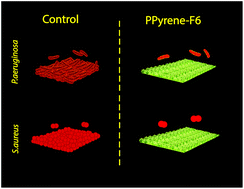A blue luminescent and superhydrophobic coating based on an electropolymerized fluorinated-pyrene monomer and its planktonic bacteria and biofilm repellent properties are reported. Two different pathogenic bacterial strains (Gram-positive and Gram-negative) at two different incubation times (2 h planktonic bacterial and 24 h biofilm adhesion) were studied and monitored (analyzed) using multicolor scanning confocal fluorescence microscopy. The coating was proved to reduce bacterial adhesion by 65%. It is highly effective against biofilm attachment, with 90% reduction of bacteria surface coverage. This blue fluorescent surface provides a facile method to characterize the coating, observe the bacterial distribution and quantify the bacterial coverage rate by fluorescence imaging of different colors. Furthermore, the film does not show significant bacterial toxicity during the working incubation times.
